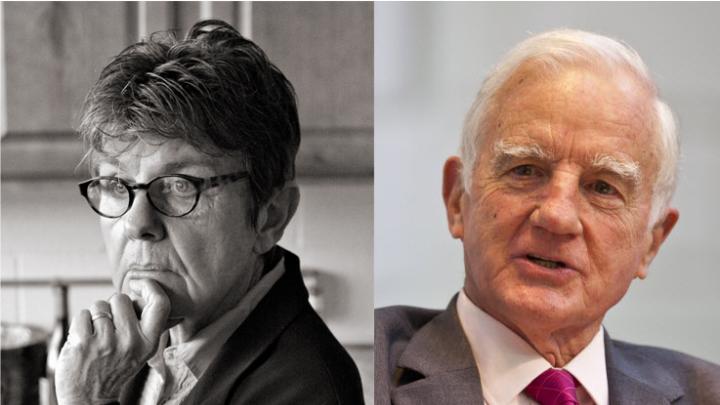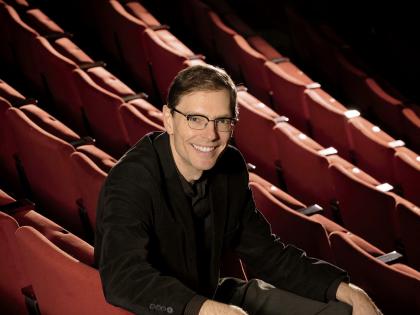The annual Phi Beta Kappa Literary Exercises in Sanders Theatre—in many ways the intellectual center of Commencement week exercises, at least for College seniors and their families—this year features two particularly interesting guests.
The poet will be Kay Ryan, a Californian who served two year-long terms as poet laureate of the United States (2008-2010), during which she initiated a project focused on poetry written by community-college students, and who was subsequently honored, in 2011, with both the Pulitzer Prize—for The Best of It: New and Selected Poems (Grove Press), described as a “witty, rebellious, and yet tender” body of work spanning 45 years, “a treasure trove of an iconoclastic and joyful mind”—and a MacArthur Foundation fellowship. From 2005 to 2011, she was a member of the Board of Chancellors of the Academy of American Poets.
The orator will be Derek Bok, Three Hundredth Anniversary University Research Professor and president of Harvard twice: from 1971 to 1991 and, on an interim basis, during the 2006-2007 academic year, between the presidencies of Lawrence H. Summers and Drew Faust. Bok has remained deeply engaged in higher education, as coauthor (with Princeton president emeritus William G. Bowen) of The Shape of the River: Long-Term Consequences of Considering Race in College and University Admissions (reviewed here), and author of Universities in the Marketplace: The Commercialization of Higher Education (excerpted here) and Our Underachieving Colleges: A Candid Look at How Much Students Learn and Why They Should Be Learning More, among other books. The latter title focused particularly on teaching, pedagogy, and assessments of learning—interests Bok has pursued and promoted throughout his Harvard career.
The Literary Exercises will take place on Tuesday morning, May 22, beginning at 11:00 a.m.
An "Exacting and Playfully Elastic" Poet
In the Library of Congress biography written for her service as poet laureate, Kay Ryan’s background is described this way:
Kay Ryan was born in 1945 in San Jose, California, and grew up in the San Joaquin Valley and the Mojave Desert. Her father was an oil-well driller and sometime-prospector. She received both bachelor’s and master’s degrees from the University of California, Los Angeles. Since 1971, Ryan has lived in Marin County….
For more than 30 years, Ryan limited her professional responsibilities to the part-time teaching of remedial English at the College of Marin in Kentfield, Calif., thus leaving much of her life free for "a lot of mountain bike riding plus the idle maunderings poets feed upon." She said at one point that she has never taken a creative writing class, and in a 2004 interview in The Christian Science Monitor, she noted, "I have tried to live very quietly, so I could be happy."
In her poems Ryan enjoys re-examining the beauty of everyday phrases and mining the cracks in common human experience. Unlike many poets writing today, she seldom writes in the first person. She has said, "I don’t use ‘I’ because the personal is too hot and sticky for me to work with. I like the cooling properties of the impersonal."
Her poetry was described there:
Ryan’s poems are characterized by the deft use of unusual kinds of slant and internal rhyming–which she has referred to as "recombinant rhyme"–in combination with strong, exact rhymes and even puns. The poems are peppered with wit and philosophical questioning and rely on short lines, often no more than two to three words each. She has said of her ascetic preferences, "An almost empty suitcase–that’s what I want my poems to be. A few things. The reader starts taking them out, but they keep multiplying." Because her craft is both exacting and playfully elastic, it is possible for both readers who like formal poems and readers who like free verse to find her work rewarding.
John Barr, president of The Poetry Foundation, said: "Halfway into a Ryan poem, one is ready for either a joke or a profundity; typically it ends in both. Before we know it the poem arrives at some unexpected, deep insight that likely will alter forever the way we see that thing."
The New York Times coverage of her appointment as poet laureate, in 2008, began, “When Kay Ryan was a student at the University of California, Los Angeles, the poetry club rejected her application; she was perhaps too much of a loner, she recalls.” It noted that she had chosen to remain something of an outsider:
“I so didn’t want to be a poet,” Ms. Ryan, 62, said in a phone interview from her home in Fairfax, Calif. “I came from sort of a self-contained people who didn’t believe in public exposure, and public investigation of the heart was rather repugnant to me.”
But in the end “I couldn’t resist,” she said. “It was in a strange way taking over my mind. My mind was on its own finding things and rhyming things. I was getting diseased.”
Dana Gioia, a poet and the chairman of the National Endowment for the Arts, was an early supporter of Ms. Ryan’s work, describing her as the “thoughtful, bemused, affectionate, deeply skeptical outsider.”
“She would certainly be part of the world if she could manage it,” he said. “She has certain reservations. That is what makes her like Dickinson in some ways.”
The Times account described her growing up in a home where her mother craved quiet, so television and radio were virtually banned, and her father, a “dreamer,” could “fail at anything”—including selling Christmas trees, drilling oil wells, and mining. After his death, according to the Times, Ryan began writing, but reluctantly: “I wanted to do it, but I didn’t want to expose myself.”
Her work is remarkably spare. Among the selections published by the Times to accompany the news of her appointment was “A Cat/A Future,” from Elephant Rocks (Grove Press, 1996):
A cat can draw
the blinds
behind her eyes
whenever she
decides. Nothing
alters in the stare
itself but she's
not there. Likewise
a future can occlude:
still sitting there,
doing nothing rude.
Her Poetry Foundation biography observes:
Her quizzical, philosophical, often mordant poetry is a product of years of thought. Ryan has said that her poems do not start with imagery or sound, but rather develop “the way an oyster does, with an aggravation.” Critic Meghan O’Rourke has written of her work: “Each poem twists around and back upon its argument like a river retracing its path; they are didactic in spirit, but a bedrock wit supports them.” [Her] meandering approach to her subject matter…Ryan says, “gives my poems a coolness. I can touch things that are very hot because I’ve given them some distance.”
Paris Review’s “The Art of Poetry No. 94” interview (Winter 2008) was prefaced with the observation that “she uses irony and humor to unravel the idiosyncrasies of language and the haplessness of human existence. She is fond of malapropisms and clichés, two linguistic devices that many poets consider taboo. She employs what she calls “recombinant rhyme”—hidden rhymes that appear in the middle, rather than at the end of her short lines.”
The interview was conducted during August 2008; although Ryan’s partner of 30 years, Carol Adair—to whom her books are dedicated—was undergoing chemotherapy for advanced cancer (she died in 2009), Ryan said they had agreed to “press on with life and to invite everything in.” Of being named poet laureate, she joked: “Nobody’s letting me cut in line at the post office or anything.”
During one exchange in the interview, Ryan said:
People have trouble with my work because they want to say it’s humorous the way Billy Collins’s poetry is humorous, and that it’s witty. But there’s something else, this cartoony thing. When I read my poems to any audience there’s a lot of laughing, but I always warn them that it’s a fairy gift and will turn scary when they get it home.
I can’t bear work that takes itself too seriously, but that doesn’t mean that my work isn’t serious.
Asked about comparisons drawn between her work and Emily Dickinson’s, she said, “That question is like asking, Do you think you’re much like God? That’s not interesting to me. It might be interesting for others, but I feel like it makes me do the work that other people ought to do. Besides, how would you like to be compared to God?”
Another Different Role for Derek Bok
Harvard's president typically joins the small party on the Sanders Theatre stage to hear the poem and oration—a brief moment when he or she can enjoy the intellectual significance of Commencement week but does not bear the burden of being the center of attention (in contrast to delivering the Baccalaureate address later that afternoon, making the rounds of reunions, and of course conferring degrees during the Morning Exercises and speaking later that afternoon). In making his return appearance to the stage for these Phi Beta Kappa exercises, Derek Bok is turning the tables: he does have to work there (the Oration is typically the principal element of the event), but he will shoulder none of the president's other obligations during the week.
Although he is writing a new book (a comprehensive examination of higher education in the United States), he indicated that it is not yet near publication and will not be the subject of his address. Rather, he indicated, he would likely reflect on recent "democratic ferment" around the world, Americans' antipathy toward politics and politicians in this country, and the implications of these developments for education and educational institutions.









